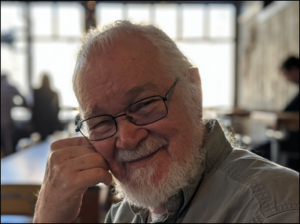Anybody who paints the front doors fire engine red is expecting company. As I walked through these doors for the first time on the way to a Gilda’s Club New Member Meeting, I was still reeling from the recent discovery: I have cancer.
I was scared, confused, and angry that I was suddenly confronting the worst news I could imagine. My best friend had convinced me, with considerable urging, that Gilda’s Club might be able to help. She pointed out, “It’s created for people dealing with cancer. Just give it a try and see how it feels.”
The red doors led to a well-appointed home with good art everywhere. But it was the library that welcomed me right away — hundreds of books, comfy chairs, good reading light, and a fireplace.
The books tell a lot about Gilda’s Club. There aren’t specific details about the latest cancer treatments — that’s the province of your medical team and the specifics of your particular cancer — but there’s a lot of information and assistance from people who know what it’s like to be living with these and other life-changing decisions. There is also a collection of age-appropriate books and other materials for people living with their cancer or providing care and support for cancer survivors and their families.

Becoming a member of the Madison Gilda’s Club was a natural choice for me to make. Deciding if I also wanted to join a cancer support group required some additional thought. At first, the very concept of a support group didn’t sound inviting at all. I imagined cancer people sharing sad tales, commiserating, and trying to feel better. I quickly learned Gilda’s support groups are, thankfully, quite different from this. These weekly meetings with a specific group of cancer survivors focus on wellness and our unique challenges. Confidentially within each group and respect for other people’s opinions are the guidelines that set the tone and scope of these meetings.
The first meeting in the support group I joined began with members welcoming me, telling me how Gilda’s benefits them, and why they keep coming back each Tuesday evening. When my turn came, I shared my name and added, “I have cancer” out loud for the first time.
Not knowing how to talk about my cancer was a significant concern. Whom do I tell? What do I say? I didn’t want my friends to drift away or become distant, avoiding “cancer” and me at the same time. I also worried about the other extreme where cancer is all my friends see, greeting me with a troubled expression and: “How are you?” instead of just saying hello.
Well-intentioned comments are always okay. But with Gilda’s Club, we have a kinship of understanding. Everyone in my group experienced similar concerns with communication and other issues. No one has to explain cancer when sharing experiences. We get it.
Everything behind the red doors echoes this fundamental difference: We get it. We can help. You do not have to face cancer alone.
